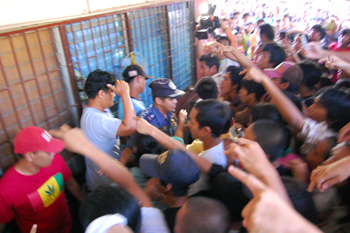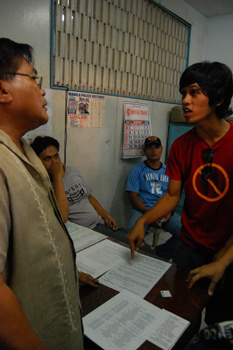By Janess Ann J. Ellao
MANILA — While walking towards the market, Cielo Marie Bayson, chairperson of the College Editors Guild of the Philippines-Cordillera (CEGP) and Kabataan Partylist regional coordinator Adrian Galang stopped after noticing that passengers of a red car took photos of them.
“Who else would do such things?” Galang asked in a statement issued recently. Some students would have taken the situation lightly, but since Kabataan Partylist and other youth groups such as CEGP have become targets of Oplan Bantay Laya 2 – the counterinsurgency program of the Arroyo administration that does not distinguish between combatants and civilians, legal and underground organizations – Bayson and Galang immediately exposed the alleged military surveillance before the media.
What happened to Bayson and Galang is not an isolated incident. Bulatlat has monitored other cases of harassment of members of progressive student organizations. There is also an alarming presence of soldiers in state universities where such groups are active.
These incidents have intensified to a point that Joanna Rose Adenit, former chair of the Gabriela chapter at the Philippine Normal University (PNU), felt the need to always bring something to defend herself with everywhere she goes. Katherine Vera, a friend of Adenit and an alumna of PNU, told Bulatlat, “She was being followed by the military.”
Red-baiting
Vera said the intense harassment and surveillance on Adenit began when the PNU administration allowed officers from the Armed Forces of the Philippines-Civil Military Operations (AFP-CMO) to hold an “Information and Awareness Forum” at the university last March 5, 2007. “It was as if there was a war going on,” Vera said, referring to the presence of soldiers roaming the campus then.

PUP students caught military intelligence officers taking picture of student leaders in a rally inside their campus. The intelligence officer were arrested by the students. (Photo Courtesy of The Catalyst / bulatlat.com)
Members of progressive organizations staged a protest action outside PNU while others attended the said forum. “When the military officers began tagging progressive organizations under the Bagong Alyansang Makabayan as communist fronts, the students reacted to defend their organizations,” she said.
Vera said the military took pictures of students who were contradicting their claims, saying that it was merely for documentation purposes. But, she said, it was obvious that they were singling out the students for surveillance later on. “They took photos of us so Torch also took photos of them (Military)” Vera said. The Torch is the official student publication of PNU.
The same forum was conducted by the CMO at the Polytechnic University of the Philippines in August 2008. The military’s presentation included a testimonial from a certain “Agnes” who claims to be a former member of the League of the Filipino Students who eventually became a New People’s Army guerrilla. Catalyst editor-in-chief Joyce Llanto said they were allowed to interview “Agnes” but, “we were surrounded by soldiers in full battle gear.”
A week later, Llanto said they were surprised when a bundle of comic books was found in an empty classroom. The comic books portrayed student organizations of PUP as members of the Communist Party of the Philippines (CPP). The comics included an illustration of a girl wearing a headband – the same headband that Llanto used while interviewing “Agnes.”
Militarizing Campuses
After the forum sponsored by the military, the surveillance on student leaders and organizations intensified. An article published in The Catalyst titled “S.I.N. Machine: Ang Makinaryang Paniktik ng AFP sa Pamantasan,” revealed that a student who was a member of the Reserved Officers Training Corps’ Cadet Officers Candidate Course (ROTC-COCC) described how they are being used to spy on members of progressive organizations in their campus.
The article exposed how students enrolled in COCC were given rank promotions and even money for their intelligence reports. “The military are using the ROTC as passports inside PUP,” JM Panganiban of Anakbayan told Bulatlat.
Not satisfied with using the ROTC, intelligence officers also do surveillance work themselves. This was confirmed when intelligence agents were caught taking pictures of students who were participating in a protest action inside PUP on August 29, 2009. “Some students tried to accost the four intelligence agents but the latter ran and hid inside the ROTC office,” Llanto said.

(Photo Courtesy of The Catalyst / bulatlat.com)
Panganiban told Bulatlat that after that incident, military officers no longer conceal themselves when inside the campus. They walk freely inside the campus grounds with their M-16 rifles.
The military’s presence is also felt at the Los Banos campus of the University of the Philippines. In an interview with Bulatlat, Perspective editor-in-chief Arbeen Acuña related that heavily armed military officers were first seen in their campus during the Laguna Peace and Order Council forum that was held in the state university “The Perspective tried to enter the venue to cover the event but we were sent away,” he said.
Acuña said they tried to take photos of the soldiers when they heard security guards reporting in their radios that the two ‘deltas’ are ‘positive’ prompting other soldiers to arrive to fetch their colleagues. “We pretended that we were raising our phones because of poor network signals,” he said.
“How could the military and local security guards have direct contact?” Acuña said, speculating that the university administration and the military are probably collaborating.
After that, more military officers became visible in their campus. A day after President Gloria Macapagal-Arroyo’s last state of the nation address, Perspective culture editor Jonelle Marin saw a military truck inside their campus. Then on September 8, 2009, Acuña saw another group of military officers going towards the College of Forestry and Natural Resources building.
An Attack on Student Organizations
Acuña of Perspective told Bulatlat that he feels threatened by the presence of soldiers inside the school. “Once I went to the canteen to find a group of armed military officers eating. I noticed that one of them was staring at me,” he said, “Later on, all of the military officers in that table were already staring at me.”
He said red tagging has become a common strategy in the UP-LB campus since the military’s presence became more and more felt. During their February 2009 student council elections, the Samahan ng Kabataan para sa Bayan (SKB), a party alliance of 55 organizations, became the target of military propaganda. Bundles of leaflets, which accused the SKB of being a communist front, were found near their school buildings and classrooms. Some leaflets were sent via registered mail to faculty members. The leaflets were signed by an obscure organization with the name, Save the Youth Against Communism and Terrorism Movement, which according to Acuña, does not exist in UP-LB campus.
Acuña said this is simply an old military tactic to cripple mass organizations, which are very active in their campus.
With the continuous privatization of state universities and colleges, youth and student organizations have been at the forefront in struggling for free and accessible education for all. Along with these, they also actively participated in battling corruption. During the ‘Hello Garci’ scandal, an election fraud issue that hounds the present administration and last year’s revival of charter change, the youth once again came out in the streets to protest.
As for PUP, Panganiban said, even the Prudente-Enrile-Ramos accord, which supposedly guarantees that soldiers would not be allowed inside the university is being disregarded. This, he said, is being done to cripple the operations of progressive student organizations and to spy on and harass student leaders.
*Originally from Bulatlat.com
http://www.bulatlat.com/main/2010/04/05/campuses-become-virtual-military-garrisons-as-soldiers-harass-spy-on-students/



